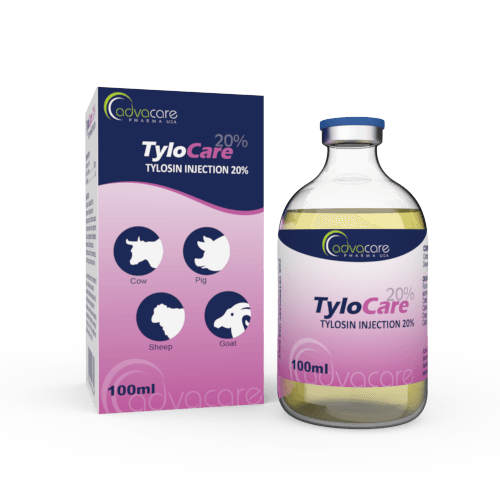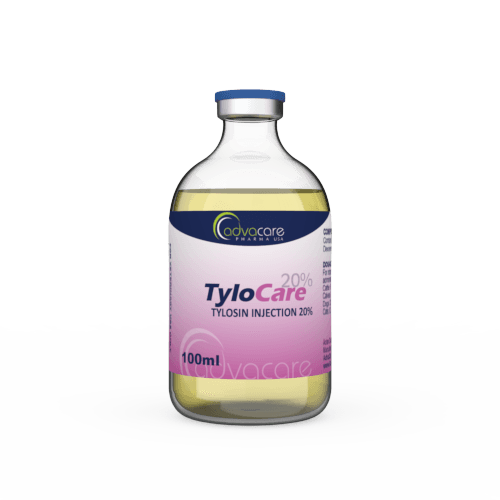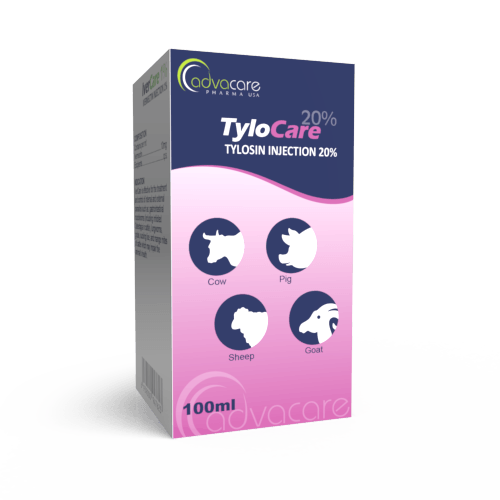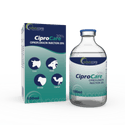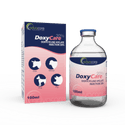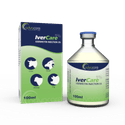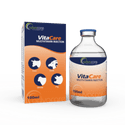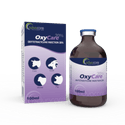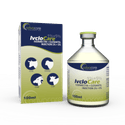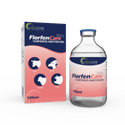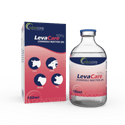- Home›
- Veterinary Pharmaceuticals›
- Veterinary Injections›
- Veterinary Liquid Injections›
- Tylosin Injection
Tylosin Injection
Dosage
Packaging
What is Tylosin?
Active Ingredients: Tylosin Tartrate
Tylosin Injection is an antibiotic drug used to treat various types of infections in both large and small animals, such as dogs, cats, cows, camels, goats, sheep, and pigs. It is indicated for the treatment of bovine respiratory complex, metritis, and acute mastitis in cows, and mastitis in sheep and goats.
It is also utilized in the treatment of mycoplasma infections, which are a common cause of respiratory and joint infections in poultry. This expands its application into avian medicine, particularly in commercial poultry production where such infections can significantly impact flock health and productivity.
This drug is also indicated in the treatment of enteritis, pneumonia, erysipelas, infectious arthritis in pigs, and soft tissue infections in small animals.
Tylosin tartrate is classified as a macrolide antibiotic. It has been derived from the fermentation product of Streptomyces fradiae. Tylosin tartrate shows a broad spectrum of activity against gram-positive organisms and a limited range of gram-negative organisms.
One of the key advantages of tylosin tartrate is its high tissue penetration, allowing it to reach effective concentrations in various body tissues and fluids. This makes it particularly useful in treating deep-seated infections where other antibiotics might not be as effective. Additionally, tylosin is known for its rapid absorption and distribution in the animal body, leading to quick therapeutic effects.
It is important to note that Tylosin Tartrate Injection is for veterinary purposes only. Like other antibiotics, administration should be based on susceptibility testing to avoid the development of antibiotic resistance.
This drug is sold in various concentrations: 5%, 10%, and 20%, packaged in 10ml, 30ml, 50ml, and 100ml vials.
AdvaCare Pharma is a trusted global exporter of Tylosin Tartrate Injection. This veterinary medicine is produced in our GMP-certified facilities in China, India, and the USA. These facilities are routinely audited to ensure they comply with health, safety, and environmental standards.
Why are we a trusted Tylosin manufacturer?
Tylosin Injection is manufactured and globally distributed by AdvaCare Pharma, a leading manufacturer of veterinary injections in the pharmaceutical industry. We have been committed to distributing high-quality, GMP-certified veterinary medications for the global market over the past 20 years. As a top Tylosin manufacturer, we ensure that all of our 100+ veterinary injections surpass our distributors' requirements by conducting routine internal and third-party facility audits.
Uses
What is Tylosin used for?
It's used to treat various bacterial infections including:
- bovine respiratory complex
- metritis
- mastitis
What animals can be treated with Tylosin Injection?
It's recommended for cats, dogs and livestock like camels, cows, sheep pigs, and goats.
How is a Tylosin Injection used?
This medication has been manufactured as a liquid, which is packaged in a vial. It is intended to be administered by intramuscular injection. Tylosin Tartrate Injection is intended for veterinary use only.
What is the mechanism of action of Tylosin?
The drug inhibits bacterial protein synthesis by binding to the 50S ribosomal subunit within susceptible bacteria. This binding interferes with the elongation of the growing peptide chain during translation, thus halting the synthesis of essential bacterial proteins. As a result, bacterial growth and reproduction are disrupted, leading to cell death.
What class of antibiotic is Tylosin?
This drug is a member of the macrolide class of antibiotics. Macrolides are characterized by their large lactone rings and are effective against a wide range of gram-positive bacteria, some gram-negative bacteria, and mycoplasma.
How long does it take for Tylosin Injection to work?
In some cases, improvement in clinical symptoms may be observed within the first 24 to 48 hours after the initial injection. To achieve the full therapeutic effect and complete resolution of the infection, receiving animals should complete the entire 5-day course.
What is the withdrawal period for Tylosin Tartrate?
The withdrawal period is 21 days for cattle and 14 days for swine. This medicine is not recommended for use in lactating dairy cattle. Do not use in calves to be slaughtered for veal.
Is Tylosin available without a prescription?
No, it is a prescription medication intended for veterinary use only and should only be used under the supervision and guidance of a licensed veterinarian.
What species should never be given Tylosin Injection?
The drug should never be administered to horses. Horses are particularly sensitive to tylosin, and its use in equines can lead to severe adverse effects, including colic and potentially fatal diarrhea.
Can Tylosin be used for the prevention of bacterial infections in healthy animals?
This drug is typically prescribed for the treatment of existing bacterial infections and is not recommended for routine preventive use. Its application should be based on a specific diagnosis and veterinary recommendation.
Is it necessary to complete the entire course of Tylosin Tartrate treatment even if the animal's symptoms improve?
Yes. Complete the full prescribed course of Tylosin Tartrate treatment even if the animal's symptoms improve before the regimen is finished. Prematurely discontinuing may lead to incomplete bacterial eradication and potential treatment failure.
Are there any known drug interactions with Tylosin?
Yes, there are. Concurrent use with other macrolide antibiotics, such as erythromycin, may lead to antagonistic effects. Its simultaneous administration with drugs that inhibit liver enzymes, such as ketoconazole, can result in elevated Tylosin Tartrate levels in the bloodstream, leading to increased risk of side effects or toxicity.
Is Tylosin Tartrate the same as just tylosin?
They are related, but not the same. Tylosin Tartrate is a specific salt form of tylosin, which is an antibiotic belonging to the macrolide class. The tartrate salt is often used in pharmaceutical formulations for veterinary use, such as injectable drugs.
How should Tylosin Injection be stored?
This medication should be stored in a dark, dry location under 30°C. The vial should be sealed tightly.
Dosage
How much Tylosin Injection should be given to cows?
The usual dose is 8mg per 0.45kg of body weight, given once per day IM (intramuscular). Treatment should be continued once per day until the animal is asymptomatic. The duration of treatment should not exceed 5 days. More than 10ml per injection site is not recommended.
How much Tylosin Injection should be given to pigs?
The usual dose is 4mg per 0.45kg of body weight, given once per day IM. Treatment should be continued once per day until the animal is asymptomatic. The duration of treatment should not exceed 5 days. It is not recommended to give more than 5ml per injection site.
What should be done if a dose is missed?
Administer the missed dose as soon as possible and then continue with the regular once-daily dosing schedule. Be sure to consult a veterinarian for specific guidance, as treatment interruptions can affect the overall effectiveness of the drug.
Can the dose be divided into multiple smaller injections throughout the day?
Administer the entire daily dose as a single IM treatment. Dividing the dose into multiple injections may not provide the desired therapeutic effect.
Why should treatment not exceed 5 days?
The recommended 5-day limit for Tylosin Tartrate Injection usage is primarily to mitigate the risk of developing antibiotic resistance. Prolonged antibiotic exposure can lead to the selection of resistant bacterial strains, making future infections more challenging to treat.
Refer to a veterinary doctor or pharmacist for guidelines on dosage.
Side Effects
As with all pharmaceuticals, some unwanted effects can occur from the use of Tylosin Injection.
Some common side effects may include but are not limited to:
- pain at injection site (local irritation)
- gastrointestinal effects (ex. diarrhea)
- pruritus
- decreased appetite
Serious side effects may include:
- allergic reaction (skin rash, fever, facial swelling, or difficulty breathing)
- shock and death in piglets (due to overdosage)
Immediate medical attention is needed in case serious side effects manifest. In the case of an allergic reaction, discontinue the medication at once and seek emergency care.
For a comprehensive list of all possible side effects of this medication, consult a veterinarian.
Precautions
Do NOT use Tylosin Injection for an animal that:
- has a known allergy or hypersensitivity to any of the ingredients.
- is hypersensitive to other macrolide antibiotics such as erythromycin.
- belongs to the following species: equine.
- has severe hepatic or renal impairment.
- is concurrently taking medications known to interact adversely with macrolides (ex. antibiotics, antifungals).
What are the most common animals Tylosin Injection is used for?
Tylosin Injection is commonly used in various animals for the treatment of bacterial infections:
- Dogs: The injection may be administered to dogs to treat conditions such as respiratory tract infections or skin infections.
- Camels: In camels, it is used to combat bacterial infections. The dosage is calculated based on the camel's body weight, with IM being the preferred route of administration.
- Cats: Tylosin Tartrate Injection is employed in cats to address bacterial infections. The appropriate dosage is determined by the cat's weight.
- Cows: Cows with bacterial infections, including respiratory issues and mastitis, may receive Tylosin Tartrate Injection via intramuscular injection.
- Goats and Sheep: Tylosin Tartrate Injection can be used in goats and sheep to treat bacterial infections.
- Pigs: For pigs, the drug is utilized to address bacterial infections, particularly in cases like swine respiratory diseases.

You might be interested in...
Why AdvaCare Pharma?
As an industry leader, we are aware of our responsibility to provide affordable and sustainable solutions to improve healthcare worldwide.
